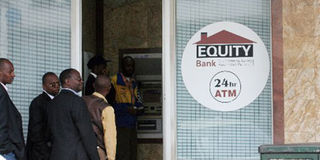Equity, StanChart Q1 profits drop on Covid-19, higher expenses

Equity Bank clients queue to use an ATM in Nairobi. Fraud within the financial sector is a global phenomenon. Photo/FILE
What you need to know:
- Operating expenses grew by six per cent to Sh3.6 billion, driven by investments technology.
- Equity’s non-performing loans jumped to Sh44.6 billion from Sh29.3 billion, forcing the lenders to increase costs linked to defaults to Sh3.1 billion from Sh409 million in the same period last year.
Equity and Standard Chartered (Kenya) banks yesterday became the first top lenders to announce a drop in earnings for the three months to March by 14 per cent and 16.6 per cent respectively.
Equity, the country’s second-largest bank by assets, said first-quarter net profit fell to Sh5.2 billion, compared to Sh6.1 billion in a similar period last year due to a rise in bad loans.
The bank linked the drop to the effects of Covid-19, which has reduced business activity and shed jobs, leading to a spike in loan defaults across Kenya’s banking industry.
LOANS
Equity’s non-performing loans jumped to Sh44.6 billion from Sh29.3 billion, forcing the lenders to increase costs linked to defaults to Sh3.1 billion from Sh409 million in the same period last year.
“The global Covid-19 pandemic has mutated into a global economic crisis, occasioned by a sudden standstill in economic activity as a result of the global lockdown.
“This has introduced unprecedented uncertainty within the global financial systems, prompting us to adopt a conservative approach fortifying our balance sheet and assuring ample liquidity to support our customers,” said Equity chief executive James Mwangi.
On the other hand, StanChart reported a net profit of Sh2 billion in the review period, compared to Sh2.4 billion a year earlier on reduced income and increased operating expenses.
The drop in profit was driven by a decrease in both interest and non-interest income.
INTEREST DROPPED
Total interest income dropped from Sh6.88 billion last year to Sh6.1 billion. Non-interest income dropped from Sh4.97 billion to Sh4.7 billion in the review period.
Operating expenses grew by six per cent to Sh3.6 billion, driven by investments technology.
Loan loss provision went marginally up to Sh428 million year-on-year.
The World Bank expects Kenya’s economic growth will slow down to 1.5 per cent this year or contract one per cent in the worst-case scenario as the virus saps demand from trading partners like Europe and disrupts supply chains and domestic production.
This has led to layoffs, reduced cash flow for businesses and occasioned unpaid leave, setting the stage for loan defaults.
Equity Bank, which has restructured Sh92 billion or 25.1 per cent of its loan book due to the pandemic, decided to recall a proposed dividend payout of Sh2.50 per share or a total of Sh9.4 billion to conserve cash as the coronavirus bites.

